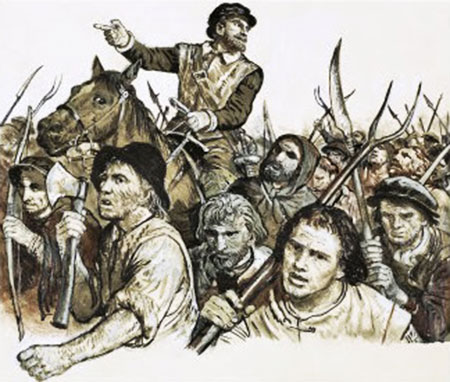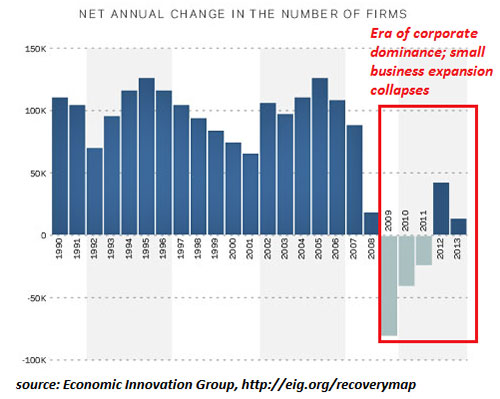|

by Patrick Wood
July 06, 2016
from
Technocracy Website
Spanish version

C.H. Smith
nailed it:
"There is no avenue left for
advocacy, grievances or redress in a system dominated by global
corporations."
In the old feudal days, peasants with
pitchforks and torches could assault the lord's castle on a hill.
Today, there is no castle nor even a hill. Yet, we still have the
same grievances, angst and desires for peace, safety and prosperity.
Smith writes,
The reality is there is no avenue
left for advocacy, grievances or redress in a system dominated
by global corporations. The castle on the hill doesn't exist; it
is diffused all over the planet, and well protected by state
minions controlled by neofeudal corporate interests.
Do you really think it's mere coincidence that small business
growth has imploded in the era of corporate dominance?
As I explained yesterday in
Governments Change, the Corporatocracy
Endures, central banks dropping interest rates to
near-zero for financiers and corporations sealed corporate
dominance of finance and governance.
There are few opportunities for
small businesses when the financial and political structures
serve neofeudal corporate interests.
Corporate power destroys democracy. That is the heart of
neofeudalism.
Let me explain what happened here.
In 1970,
Zbigniew Brzezinski wrote
Between Two Ages - America's
Role in the Technetronic Era.
Three years later in 1973, Brzezinski
teamed up with financier
David Rockefeller to start
the Trilateral Commission that was
dedicated to,
"fostering a New International
Economic Order."
Brzezinski explained,
"The nation-state as a fundamental
unit of man's organized life has ceased to be the principal
creative force: International banks and multinational
corporations are acting and planning in terms that are far in
advance of the political concepts of the nation-state."
Between Two Ages
Antony Sutton and I wrote (Trilaterals
Over Washington, I and II) and lectured extensively on
this in the late 1970s.
It's too bad that more people didn't
listen to us back then, but the establishment made sure that we were
thoroughly marginalized and discredited.
In fact, the nation's largest book chain
at the time, B. Dalton Booksellers, blatantly black-listed
our books by sending out a memo to all their stores that stated,
"Trilaterals Over Washington
is out of print and the publisher is out of business."
Neither was true, but it killed our
sales.
So,
-
What part of Brzezinski's
statement above is unclear?
-
Was Between Two Ages some sort
of literary equivalent to Hitler's Mien Kampf in which he
laid out the elites' plans in terms so clear that nobody
would believe them?
Whatever the case, Brzezinski envisioned
the "ultimate solution" in his carefully defined "Technetronic Era."
What is the "Technetronic Era"? Plain and simple, it is a vision
rooted in historic Technocracy from the 1930s.
It is also the resurrection of feudalism
with many new twists thanks to advanced technology. Thus, the term
neofeudalism fits Technocracy or Technetronic perfectly:
A few own all the resources and then
tell everyone else what they can or can't do on planet earth.
In 1938, The Technocrat magazine
defined Technocracy as follows:
"Technocracy is the science of
social engineering, the scientific operation of the entire
social mechanism to produce and distribute goods and services to
the entire population…"
This is exactly what is happening today:
social engineers working with global
corporations to take over the entire economic and social
landscape.
Thus, society is being 'scientifically'
reengineered to serve the corporate lords.
The old-fashioned terms of 'supply' and
'demand' don't apply any more. Consumer demand is artificially
manipulated to soak up whatever global corporations decide they want
to manufacture.
In other words, Technocracy is a complete takeover of both the means
of production and consumption, a feat never before attempted nor
achieved in the history of the world.
You might never have heard of Technocracy before, but can you
feel the manacle of scientific dictatorship tightening around your
neck?
In my opinion, this is why Britain recently voted to
leave the European Union, which is
openly called a Technocracy in the European press. This is also why
Trumpism is accelerating in America.
Simply put, people don't have to understand the cause in order to
feel the pain. Oh, would that there were a castle on a hill that we
could assault and demand that our grievances be heard.
However, because Technocracy and
Technocrats are so thoroughly infused into society,
institutions and corporate culture, it is impossible to hold their
feet to the fire.
Neofeudalism and Peasants with Pitchforks
- Corporate Power Destroys
Democracy -
by Charles Hugh Smith
July 05, 2016
from
CharlesHughSmith Website

There is no avenue left for advocacy, grievances or redress in a
system dominated by global corporations.
In the original version of feudalism, peasants armed with pitchforks
knew where to go for redress or regime change:
the feudal lord's castle on the
hill.
Though you won't find this in
conventional narratives of the Middle Ages, peasant revolts were a
common occurrence.
Serfs weren't always delighted to toil
for their noble masters.
-
In the present era of corporate
dominance, where can serfs go to demand redress and
financial freedom from the neofeudal system? Now here. The
global corporations that own the land and the productive
assets have no castle that can be stormed; they exist in an
abstract financial world of stock shares, buybacks, bonds,
lobbyists and political influence.
-
When the agribusiness
corporation fouls the local water supply with animal waste,
where do the local peasantry go to demand restoration of
their water quality? The corporation? What if the
headquarters are thousands of miles away?
-
What impact will 100 serfs
gathered outside the modern-day castle have on water quality
in a distant land? Zero, because the corporation has
rendered it illegal (via lobbying the local political
flunkies desperate for "jobs" and campaign contributions) to
even take photos of their vast animal-waste output or their
inadequate disposal.
-
Where do oppressed serfs go to
advocate for transparency in America's private Gulag prison
system? If you go to the prison to protest, you'll be
arrested and will soon be looking at the world from inside
the privately operated gulag.
-
Once again - where is the castle
on the hill? It's not there. The corporate operators of the
private Gulag are far away, and security will disperse any
troublesome serfs who travel hundreds of miles to air
grievances.
Documenting abuses in the privately
owned and operated Gulag is illegal.
Corporate lobbying and campaign
contributions have ensured that any attempt to document neofeudal
exploitation by corporations is illegal. And of course if
documentation is impossible to obtain, then the exploitation doesn't
exist.
The mainstream media's default
setting is to dismiss first-hand accounts as "he said, she said":
the imprisoned serf says this, and
the private prison spokesperson says that, and without any proof
that can stand up in court, the grievance vanishes into thin
air.
Try telling the African peasant who is
unhappy with the Chinese owners of the land he tills to take his
grievances to the owners of the land - a corporation in distant
China that is owned by the Chinese army.
The reality is there is no avenue left for advocacy, grievances or
redress in a system dominated by global corporations. The castle on
the hill doesn't exist; it is diffused all over the planet, and well
protected by state minions controlled by neofeudal corporate
interests.
Do you really think it's mere coincidence that small business growth
has imploded in the era of corporate dominance?
As I explained yesterday in
Governments Change, the Corporatocracy Endures,
central banks dropping interest rates to near-zero for financiers
and corporations sealed corporate dominance of finance and
governance.
There are few opportunities for small
businesses when the financial and political structures serve
neofeudal corporate interests.
Corporate power destroys democracy.
That is the heart of neofeudalism...

|




